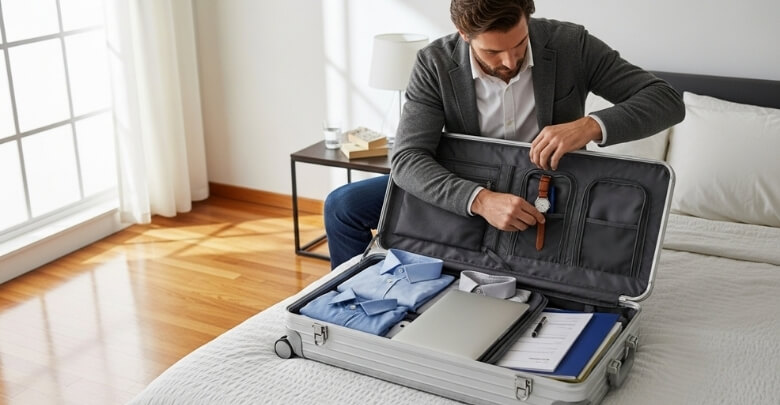Traveling for a conference can feel exciting, but it often brings stress as well. Early flights, busy schedules, and crowded airports can make the trip tiring. On top of that, packing and keeping track of documents can add pressure. All of this can leave you feeling drained before the event even starts.
Which makes you start to wonder, how to handle conference travel stress?
Handle conference travel stress by planning early, packing with a checklist, and giving extra time for flights. Don’t try to do too much—take breaks and rest. Stay calm with deep breaths and keep things like tickets organized. Talk to friends or family to feel supported during the trip.
In the rest of this article, we’ll share easy tips to make conference travel less stressful.
How to Handle Conference Travel Stress?
Attending conferences can feel rewarding, but travel often adds unexpected stress. From tight schedules to busy airports, small things pile up. With the right strategies, you can stay calm and make the experience enjoyable. Here are some practical ways to manage stress and make conference travel smoother.
1. Plan Your Schedule Ahead
- Creating a clear itinerary gives structure and helps you know where to be without extra stress.
- Checking maps of venues saves time and ensures you won’t rush when moving between different conference locations.
- Marking important sessions beforehand helps you stay focused and prevents missing talks that matter to your growth.
2. Set Realistic Goals
- Listing achievable goals avoids overload and ensures you don’t feel pressured by unrealistic expectations during travel.
- Balancing professional priorities with personal downtime creates harmony and helps you enjoy both learning and resting.
- Tracking progress during the event motivates you, while reminding you to avoid doing more than you can.
3. Pack With a Checklist
- Writing a checklist reduces last-minute panic and ensures you don’t forget essentials like chargers, tickets, or ID.
- Folding clothes neatly saves space and keeps your bag organized, making it easier to find items quickly.
- Packing snacks and water supports energy throughout the day, helping you stay comfortable during longer conference sessions.
4. Allow Buffer Time
- Arriving early at the airport avoids stressful rushing and leaves you calm before moving through security procedures.
- Planning extra minutes between sessions allows mental breaks, helping you recharge before joining another important presentation.
- Leaving margin for transport delays ensures small issues don’t ruin your day or distract from the conference.
5. Take Care of Yourself
- Drinking water often helps fight tiredness, while regular meals keep your body fueled for long networking days.
- Short stretches or a walk reduce stiffness and refresh your focus during breaks between sessions or talks.
- Sleeping enough at night restores energy, letting you handle busy schedules without burning out quickly or easily.
6. Stay Flexible and Relaxed
- Accepting changes calmly keeps you focused when sessions get rescheduled or unexpected travel issues appear suddenly.
- Using deep breathing lowers tension, giving your mind clarity when faced with crowded airports or busy streets.
- Keeping expectations light helps you enjoy the experience more, rather than stressing over things beyond your control.
7. Stay Connected and Supported
- Calling family members provides comfort and support, helping you feel grounded even in a new environment.
- Talking with colleagues strengthens bonds, making conferences more meaningful through shared learning and friendly company.
- Sharing updates online encourages professional growth and shows peers you are actively involved in the event.
Conferences happen all over the world, from Germany and Singapore to Canada. The United States also hosts countless industry gatherings, and staying prepared can help you enjoy upcoming conferences in USA without feeling overwhelmed by travel stress. Planning location-specific needs ahead of time makes every event smoother.
Common Mistakes That Add to Travel Stress
Travel often brings excitement, but it also comes with challenges that increase stress. Small mistakes can quickly make the trip harder. Many travelers rush, forget key items, or ignore their own limits, and these things add unnecessary pressure. By understanding these common mistakes, you can avoid them and make travel much smoother.
- Poor Time Planning: Missing flights often comes from underestimating travel time, and not leaving buffers for traffic or airport security delays.
- Overstuffed Luggage: Heavy bags create frustration, slow down movement, and increase fatigue, while forgetting essentials means unnecessary shopping and wasted valuable energy.
- Skipping Rest Periods: Exhaustion builds when travelers move without breaks, making it difficult to focus on important meetings or enjoyable cultural exploration.
- Unclear Itinerary: Confusion happens when schedules remain unorganized, causing missed connections, forgotten reservations, and added stress during important moments.
- Ignoring Hydration: Lack of water causes fatigue, headaches, and irritability, which all lower energy during long journeys or conference sessions.
- Too Many Commitments: Overbooking meetings and events leads to rushing, stress, and missed opportunities to enjoy meaningful networking experiences.
- Neglecting Relaxation: Forgetting to breathe deeply or disconnect briefly increases tension, leaving travelers unable to manage small, unexpected problems smoothly.
What Causes Stress During Conference Travel?
Traveling for a conference sounds exciting, but it can quickly turn into something that feels heavy. Many people expect smooth experiences, yet small problems often pile up and create stress. Simple mistakes or sudden changes can push your patience to the limit. With so many things happening at once, it’s easy to feel overwhelmed. Here are the common causes of stress that travelers often face during conference trips.
Last-Minute Plans
When plans are made at the last moment, stress quickly takes control. Packing becomes rushed, and important items may be forgotten. Running to book tickets or arrange transport adds more pressure. Starting your trip without enough preparation often makes everything feel harder.
Preparation Fatigue
Getting ready for a conference takes a lot of effort. Packing clothes, organizing notes, and checking documents can be exhausting. Sometimes people stay up late finishing these tasks, which leads to tiredness. By the time travel starts, energy already feels drained.
Long Waiting Times
Airports, hotel check-ins, and security checks often involve waiting for hours. Standing in long lines makes travelers impatient and restless. Delays break the flow of the day and waste valuable time. These pauses often increase irritation and reduce excitement for the event.
Unfamiliar Places
Being in a new city or country can create worry. Finding directions becomes confusing when streets or signs feel unclear. Language barriers sometimes make it hard to ask for help. These challenges often make travelers nervous about moving around.
Environmental Issues
Weather conditions can ruin even the best plans. Extreme heat, heavy rain, or snow add extra discomfort during travel. Overcrowded venues or loud noise in public spaces can raise stress levels. Jet lag from crossing time zones also leaves many people tired.
Mental Pressure
Some travelers feel nervous about meeting expectations. The fear of not achieving conference goals adds extra stress. Decision fatigue appears when too many choices must be made quickly. Worry about personal safety also weighs heavily on the mind.
Poor Sleep
Sleeping well in hotels is not always easy. Uncomfortable beds or loud surroundings disturb rest. Missing familiar comforts from home also affects the quality of sleep. Without proper rest, energy levels stay low and moods often become negative.
Work Concerns
While traveling, many people leave important work behind. Thinking about unfinished tasks makes them feel distracted. The pressure to prove the value of the trip adds to stress. Balancing both responsibilities at once often feels too heavy to carry.
What Can You Turn Stress into a Positive Experience?
Stress is something everyone feels, and it often comes during important times. Many people see it as a heavy problem, but it can also be useful. The way you respond to stress changes how it affects you. With the right steps, stress can bring good outcomes. Here are some positive ways stress can actually help you grow.
More Focus
Stress often pushes you to pay closer attention. It helps your brain stay sharp and notice small details. When deadlines appear, stress can push you to act faster. Instead of freezing, you stay alert and focused.
Strong Motivation
Stress sometimes acts like a reminder that goals are important. It pushes you to keep moving forward with energy. Even small challenges can give you drive when you know the result will matter. That energy helps you complete tasks on time.
Better Problem-Solving
Stress can make you think differently. Instead of ignoring problems, you start looking for solutions more quickly. It gives you the push to stay creative. With that extra push, you often find smart ways to handle tough situations.
Building Strength
Each stressful moment teaches you something new. Facing stress and managing it helps you grow stronger inside. Once you handle one hard situation, the next one feels less scary. Over time, you gain more confidence in yourself.
Time Awareness
When stress is present, you value time more. It helps you notice deadlines and prepare better. Instead of wasting hours, you use them carefully. This way, stress helps you manage your time wisely.
Personal Growth
Stress shows you how much you can handle. It teaches patience and discipline while reminding you of your limits. Overcoming stressful situations makes you feel proud of yourself. These moments help you discover more about your strengths.
More Appreciation
After stress passes, the calm moments feel even better. You enjoy rest, peace, and small joys more deeply. Stress reminds you why balance matters. It makes you value the good times that follow.
Preparing Before You Travel: Packing and Planning Smart
Travel feels smoother when you prepare well before leaving. Smart planning saves time, energy, and keeps stress levels low. A little organization before you leave can make your trip far more enjoyable and less overwhelming. To get started, focus on these steps that make travel preparation easier.
Make a Checklist
- Writing down items ensures nothing important is forgotten, and every category feels covered while reducing unnecessary last-minute stress.
- Checking items off the list gives confidence and helps you pack smarter while keeping track of important travel essentials.
Choose Light Clothing
- Rolling lightweight clothes inside luggage saves space and helps keep bags easier to carry during busy travel situations.
- Wearing versatile outfits during travel days makes packing simpler and helps you stay comfortable in different environments.
Organize Essentials
- Placing passports, tickets, and money together in a pouch saves time and prevents stress caused by misplaced travel documents.
- Keeping toiletries inside small travel bottles avoids bulk and ensures items pass security checks without creating unexpected delays.
Allow Extra Time
- Reaching airports early reduces stress and gives space to handle unexpected issues without feeling rushed or anxious.
- Leaving margins between connecting transport plans avoids mistakes and ensures smoother transitions between flights, trains, or conference venues.
Stay Flexible Abroad
- Unexpected changes in schedules require calm reactions, and learning to adjust helps reduce stress during unfamiliar travel conditions.
- Adding relaxation breaks between sessions creates balance and supports energy levels while managing international conference travel effectively and smoothly.
Pack Healthy Snacks
- Carrying small snacks like nuts or granola bars maintains energy and prevents hunger during long waits or extended travel times.
- Drinking enough water along the way keeps you hydrated and reduces fatigue when days stretch longer than expected.
Use Technology Smartly
- Saving booking confirmations and hotel details on your phone makes things faster and prevents searching through papers in crowded areas.
- Installing translation or map apps improves convenience and helps when directions or communication barriers create unnecessary travel challenges.
Rest Before Leaving
- Sleeping enough the night before travel increases focus and prevents unnecessary exhaustion during early flights or long train rides.
- Taking short breaks before the trip refreshes your mind and keeps you balanced while handling details and travel responsibilities.
How Do You Stay Calm During Flights and Layovers?
Flying often brings excitement, but it can also bring moments of worry or tiredness. Long waits at airports may feel frustrating, and hours in the air can seem endless. Many travelers feel restless when schedules change suddenly. Staying calm helps the trip feel smoother and easier. These simple habits and mindful choices can make a big difference while you travel.
Deep Breathing
Breathing slowly and deeply helps your body relax. It reduces tension in your shoulders and clears your mind. When flights get bumpy or delays happen, focus on steady breaths. This simple practice makes stressful moments feel easier to handle.
Stay Entertained
Flights and layovers can feel boring without something to do. Bringing books, music, or puzzles keeps your mind busy. Entertainment helps distract you from stress or tiredness. Having options ready ensures you never feel stuck with nothing enjoyable.
Move Around
Sitting too long makes your body stiff and uncomfortable. Taking short walks during layovers helps your muscles loosen up. On flights, stretching your legs and arms makes a big difference. Movement keeps your body energized and your mind more relaxed.
Stay Hydrated
Drinking water is often important because dry air inside planes makes you feel tired. Staying hydrated keeps your energy balanced. Avoiding too much soda or coffee helps your body stay calm. Water keeps you refreshed through long hours of waiting or flying.
Eat Light
Heavy meals can make you feel sluggish during flights. Choosing lighter snacks helps your stomach feel comfortable and settled. Fruits, nuts, or sandwiches are easier to digest while traveling. Eating small portions at regular times supports better focus and calmness.
Stay Positive
Sometimes flights get delayed, or layovers last longer than planned. Accepting these changes calmly helps lower stress. Focus on the idea that delays are temporary. A positive mindset turns frustrating waits into more manageable experiences.
Sleep Well
Resting during travel keeps your mood stable. Short naps on the plane or in waiting areas refresh your body. Using a small neck pillow or eye mask makes rest easier. Sleep helps you stay calm even during long hours of travel.
Managing Jet Lag and Time Zone Differences
Traveling across time zones can feel exciting at first, but your body sometimes struggles to keep up. Tiredness, headaches, and trouble sleeping are common when your internal clock feels out of balance. These effects often make it harder to focus. Here are a few smart ways to adjust and make the experience less stressful and more comfortable.
Adjust Sleep Early
Changing your sleep schedule before traveling helps your body adapt. Sleeping a little earlier or later prepares your system. It reduces the shock of sudden time changes. Small adjustments before the trip make a big difference during travel.
Drink Enough Water
Air travel dries out your body quickly. Drinking water regularly keeps you feeling refreshed and energized. Avoiding caffeine and soda makes it easier to rest. Staying hydrated lessens the effects of jet lag on your body.
Get Natural Light
Sunlight helps reset your internal clock. Spending time outdoors after arrival signals your body about the new schedule. Walking in daylight improves energy levels. Natural light makes the adjustment to a new time zone easier and smoother.
Eat at Local Times
Meals give signals to your body about the time. Eating breakfast, lunch, and dinner at local hours helps you adjust faster. Avoiding heavy food at the wrong times improves digestion. Sticking to local meal patterns keeps your energy balanced.
Take Short Naps
Napping for too long can confuse your body clock. Short naps of twenty minutes give energy without harming sleep. Using a quiet space or an eye mask makes resting easier. Small naps keep you awake and active during the day.
Plan Smartly
Good planning reduces jet lag stress. Scheduling lighter activities on the first day helps your body adjust slowly. Keeping busy with easy tasks avoids sleepiness. Learning useful travel hacks for conferences can also save energy when you need it most.
Stay Relaxed
Stress makes jet lag worse. Breathing deeply, stretching, or listening to calming music reduces tension. Accepting that your body needs time to adjust helps you stay patient. A calm attitude makes the change in time zones less overwhelming.
Tips for Staying Organized During the Conference
Conferences bring excitement, but they can also feel overwhelming without proper organization. Sessions, meetings, and networking can pile up quickly. Many people feel stressed when things get messy during events. Staying organized keeps everything smoother and helps you enjoy the experience fully. To manage your time and energy better, focus on these tips that simplify your conference routine.
- Clear Schedule: Mark your important sessions early, and keep reminders on your phone to avoid forgetting anything throughout the busy days.
- Simple Notes: Write short notes during talks, and summarize them quickly afterward so you don’t forget details when reviewing later.
- Digital Storage: Save documents, slides, and conference papers in one folder on your device to make finding them fast and simple.
- Business Cards: Carry cards in a small holder, and write a quick note on each received card to remember important conversations.
- Essential Kit: Keep pens, chargers, and notepads in your bag, and check them every evening so nothing important is missed.
- Healthy Snacks: Store quick snacks like fruits or protein bars, and eat them during breaks to stay focused through long conference sessions.
- Daily Review: Spend a few minutes each night checking your progress, and plan tomorrow’s sessions with less pressure or stress.
- Backup Copies: Save contacts, slides, or notes in cloud storage, and check they sync correctly to avoid losing essential information suddenly.
- Comfort Items: Carry things like water, tissues, or lip balm, and use them whenever small discomforts threaten your focus and energy.
- Relax Time: Take short breaks between sessions, and breathe calmly so your mind feels clear before the next learning activity.
How to Balance Networking, Learning, and Rest?
Conferences bring many chances, but they can also feel overwhelming when you try to do everything. You might want to meet people, attend every session, and still have time to relax. Without balance, it becomes exhausting and less enjoyable. Finding the right mix helps you stay energized and focused. Here are some simple ways to keep the right balance.
Plan Ahead
Looking at the schedule before the event helps you choose what matters most. Pick sessions, breaks, and meetings carefully. This keeps your days organized and easier to manage. Planning early avoids stress and saves energy during the conference.
Quality Connections
Networking works better when you focus on meaningful conversations instead of meeting too many people. Spend time listening, not just talking. Good connections often grow from small discussions. These conversations stay more memorable than exchanging business cards quickly.
Learn Smartly
Trying to attend every talk can feel tiring. Choose the ones that truly connect with your interests. Take short notes during sessions to remember ideas better. Focusing on fewer sessions helps you understand and use the knowledge well.
Short Breaks
Resting between activities gives your body time to recover. Even a ten-minute pause can refresh your mind. Use breaks to stretch or drink water. Small rests keep your focus steady through long conference days.
Evening Relaxation
After a long day, allow yourself time to relax. Go for a walk, listen to music, or read. Relaxation helps release stress and prepares you for the next day. Quiet evenings support better sleep and stable energy.
Balance Priorities
You don’t need to do everything at once. Decide what matters most each day—learning, networking, or resting. This keeps your schedule flexible and less overwhelming. Balance means giving attention to all areas without burning out.
Listen to Yourself
Pay attention to how you feel. If you feel tired, rest instead of forcing another session. Energy changes throughout the day, so adjust your plans when needed. Listening to your body helps you stay healthy and calm.
Frequently Asked Questions About Handling Conference Travel Stress
Traveling for a conference can feel exciting, but stress often tags along. From keeping track of essentials to managing your time, many small details can overwhelm you. These FAQs give simple answers to help make conference travel less stressful.
How Can I Avoid Stress From Early Morning Flights?
Booking afternoon flights when possible gives you more rest. If early flights are unavoidable, pack everything the night before and set multiple alarms. Allow plenty of buffer time in the morning to reduce rushing and stressful last-minute delays.
What Should I Do If My Luggage Gets Delayed?
Always pack essentials like medicines, documents, and one change of clothes in your carry-on bag. This gives security if your main luggage gets delayed. Report missing baggage immediately at the airport desk, and track updates until resolved.
How Can I Stay Productive Without Feeling Exhausted?
Set aside short bursts of work time instead of long hours. Carry a compact notebook or device for quick updates. Use breaks for rest, not extra work, so your productivity doesn’t drain your conference energy.
What If I Get Lost Around The Venue?
Download maps of the area and save them offline before leaving. Ask event staff for clear directions when unsure. Following signs inside venues also helps. Staying calm and allowing buffer time prevents stress when exploring unfamiliar conference areas.
How Can I Manage Food-related Stress While Traveling?
Carry light snacks like nuts, granola, or fruits for quick energy. Research nearby restaurants beforehand to avoid long searches. Eating balanced meals at proper times supports focus. Staying prepared prevents the stress of hunger or unhealthy food choices.
What Should I Do If Technology Fails During the Trip?
Save important presentations and notes on cloud storage and a USB drive. Carry a power bank for emergencies. Double-check device chargers before leaving. Having backup options ensures small tech issues don’t create unnecessary stress at conferences.
How Can I Stay Comfortable During Long Travel Days?
Wear breathable clothes and supportive shoes for easier movement. Bring a neck pillow or small blanket for added comfort. Standing, stretching, and walking during breaks keeps your body refreshed. Comfort makes long travel days less stressful and draining.
What If I Feel Overwhelmed By Networking?
Start with smaller conversations instead of approaching big groups. Focus on quality discussions, not quantity. Take short breaks to recharge between meetings. Remind yourself that meaningful interactions matter more than meeting everyone, which reduces pressure and stress.
How Can I Stay Calm When Plans Change Suddenly?
Always keep extra time in your schedule for unexpected changes. Accepting adjustments with patience helps lower stress. Carrying digital copies of bookings and flexible plans also makes it easier. Calm responses often turn last-minute changes into manageable experiences.
What Should I Do If I Miss an Important Session?
Check if sessions are recorded or if slides are shared afterward. Politely ask colleagues or speakers for notes. Don’t panic, as missing one session won’t ruin your experience. Focus on the rest of the event and keep learning.
Closing Remarks
Conferences should feel exciting, but travel stress can quickly make them tiring. Simple habits can change the whole experience for the better. Packing light, planning your schedule, and resting when needed will keep things easier. Remember that knowing how to handle conference travel stress is about small steps, not big efforts.
Staying calm with breaks, snacks, and short walks will keep your energy steady. Talking with friends or colleagues can also make you feel supported. When you prepare wisely and give yourself time to breathe, the trip feels lighter, and the conference becomes far more enjoyable.










